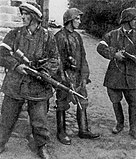Ferdynand Arczyński

Ferdynand Marek Arczyński (December 8, 1900 in Kraków – 1979 in Warsaw), cryptonym "Marek" or "Lukowski", was one of the founding members of an underground organization Żegota (Council for Aid to Jews) in German-occupied Poland, from 1942 to 1945. Żegota's express purpose was to help the country's Jews survive the Holocaust; find places of safety for them, and provide relief payments to thousands of families.[1] Poland was the only country in occupied Europe with such an organization during World War II.[2]
Life
Born in 1900, Arczyński participated in the Silesian Uprisings (1919–21) during the formation of the sovereign Second Polish Republic. He was a member of the Polish Democratic Party and an editor of the Polish Daily (Dziennik Polski, pl) in Kraków. Following the Nazi-Soviet invasion of Poland, Arczyński worked tirelessly for Żegota, serving not only as treasurer but also as head of its legalization department, liaison with branches of Żegota in Kraków, Lwów and Lublin. He was an unofficial, but successful recruiting officer.
Saving Jews
As Żegota treasurer and head of the Legalization Bureau, Ferdynand Arczyński produced daily hundreds of false IDs, work cards, Roman Catholic birth and marriage certificates which were given out free of charge to some 4,000 Jews hiding on the "Aryan" side of the ghettos. He arranged for places to live, medical help, and monthly cash disbursements. He helped with providing aid to Jews in concentration camps. Arczyński, "Marek", was also a founding member of Kraków and Lwów branches of Żegota.[citation needed]
After the war, Marek Ferdynand Arczyński served as Member of Parliament (Sejm) from 1947 until 1952,[3] in the Department of Communication, and worked as a journalist.[4]
| Part of a series on the |
| Polish Underground State |
|---|
 |
References
- ^ David Cesarani, Sarah Kavanaugh, Holocaust Published by Routledge. Page 64.
- ^ Andrzej Sławiński, Those who helped Polish Jews during WWII. Translated from Polish by Antoni Bohdanowicz. Article on the pages of the London Branch of the Polish Home Army Ex-Servicemen Association. Last accessed on March 14, 2008.
- ^ Template:Pl icon Polscy posłowie: Sejm Ustawodawczy kadencja 1947 - 1952
- ^ "Kalendarz wydarzen (calendar of events): born December 8, 1900". Archived from the original on June 12, 2008. Retrieved 2013-08-17.
{{cite web}}: Unknown parameter|deadurl=ignored (|url-status=suggested) (help)
- Stanislaw Wronski, Maria Zwolakowa,: "Polacy Zydzi, 1939-1945". Warszawa, Książka i Wiedza Publishers, 1971. (illustrated, 462 pages) including copies of many original documents.
- Irene Tomaszewski and Tecia Werbowski, Zegota: The Council for Aid to Jews in Occupied Poland 1942-1945. Price-Patterson Ltd. Montreal, Canada. Reprinted with authors' permission at Project In Posterum, Preserving the Past for the Future.
- Teresa Prekerowa, Konspiracyjna Rada Pomocy Żydom w Warszawie, 1942-1945, Państwowy Instytut Wydawniczy, Warsaw, 1982.
See also
External links
- Ferdynand Arczyński – his activity to save Jews' lives during the Holocaust, at Yad Vashem website
